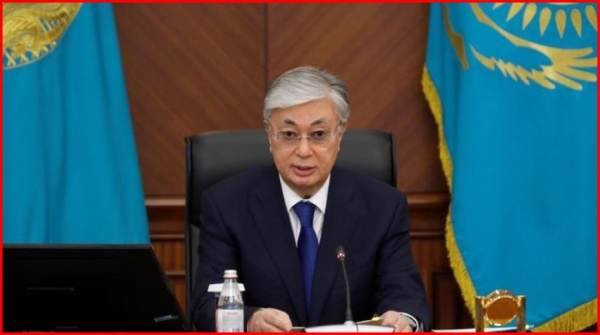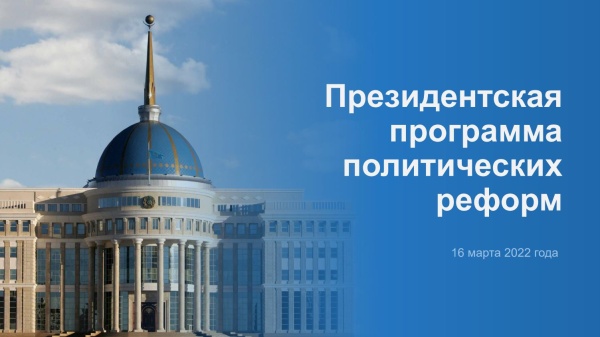Factsheet on President Kassym-Jomart Tokayev’s State of the Nation Address “New Kazakhstan: Path of Renewal of Modernization”
Nur Sultan, 16 March 2022
Overview
On 16 March 2022, President Kassym-Jomart-Tokayev delivered his State-of-the-Nation Address to the people of Kazakhstan. The head of state outlined significant political reforms and initiatives aimed at further transforming and modernising the country. These reforms lay the foundations of a New Kazakhstan.
Key points and reforms from President Tokayev’s Address
On the tragic January events

- Among those who tried to carry out a coup in January there were people well known in Kazakhstan. High-ranking officials committed treason against their state, he said. They prevented law enforcement agencies from acting in accordance with the law and provided the country’s supreme leadership with false information about the real situation on the ground.
- The investigation into the involvement of security forces and their accomplices continues. The President assured that all those responsible for these tragic events will be brought to justice, regardless of their positions in society.
- The government acknowledged the fact that some law enforcement officers engaged in practices, which can be viewed as torture, against detained citizens. As soon as the first such cases appeared, Tokayev, who earlier called torture medieval and barbaric practices, instructed to investigate them promptly.
On political reforms
President Tokayev noted that the scale of the positive changes that have taken place is demonstrated by the fact that more than ten laws have already been passed in the political sphere alone over the past three years. The law is the same for everyone – both for people in power and for public figures. He assured that the country will not deviate from the intended path and will accelerate systemic transformations in all spheres of life. Tokayev stressed Kazakhstan needs cardinal reforms, otherwise it will stagnate.
The head of state stressed that an important lesson of the “Tragic January” is that the concentration of power in the hands of the highest official in the state unjustifiably increases the influence of financial-oligarchic groups and persons close to him.
Tokayev presented a programme for the comprehensive modernization of the country’s political system. This document is primarily based on the needs and demands of society. It includes:
- Transition from a super-presidential form of government to a presidential republic with a strong parliament. Such a system will provide an optimal balance of power for institutions and will contribute to the sustainable development of the country.
- Legislation that obliges the president to terminate membership in the party for the period of his powers. This norm will increase political competition, provide equal conditions for the development of all parties.
- Legally prohibit akims (governors and mayors) and their deputies from holding positions in party branches. Such decisions will enhance a multiparty system.
- .
- Increase the independence of governors. For example, currently the President has the right to dismiss district and rural akims. Such legal provisions should be abolished.
- . For example, the registration threshold will be reduced from 20,000 to 5,000 people – a fourfold reduction (eightfold over the last three years), in regional branches – from 600 to 200 people.
- Rights and obligations of observers of electoral legislation should be clearly defined.
- Establishment of a Constitutional Court. The Prosecutor General and the Commissioner for Human Rights will be given the right to appeal to the Court, in addition to the President and the Parliament.
Specific reforms in the parliamentary and local government system
- Reduction of the quota for presidential appointments in the Senate from 15 to 10 members to give more voice to social groups that are under-represented in parliament.
- The Assembly of the People of Kazakhstan quota in the Mazhilis will be abolished. This quota is transferred to the Senate and reduced from 9 to 5 members. Accordingly, the total number of deputy seats in the Mazhilis will decrease. The Assembly is a constitutional body that is designed to represent interests of numerous ethnic communities of the nations.
- The right of the Senate should only be to approve or reject the laws already adopted by the Mazhilis. Consequently, the Mazhilis is vested with the right to pass laws.
- Parliament should strengthen control over the quality of execution of the state budget. The Supreme Accounts Chamber will be created instead of the Accounts Committee for Control over the Execution of the National Budget.
- The system of election of deputies of the Majilis will be reformed the following way: 70% of MPs will be elected on a proportional basis, while 30% will be elected on a majoritarian basis. In addition, a mixed model will be introduced in the elections of maslikhats (local parliament) of regions and cities of national significance. This will pave way for individual non-party candidates to run for a seat in the Parliament and increase both political competition and the citizens’ direct engagement with their elected MPs.
- Proposal for the President to submit at least two candidates for the positions of akims of regions and the cities of national significance to the maslikhats, local representative and consultative bodies, which will be a kind of “indirect election,” based on the results of which akims will be appointed.
Judicial-related reforms
- Study the issue of toughening punishment for violence against women and children.
- Expand the categories of cases heard by jury trials beyond the most serious crimes.
Additional reforms
- Wider involvement of public organisations and activists in the preparation and implementation of reforms.
- Revision of the law “On Mass Media” – the media should have opportunities to be more competitive and independent.
- Establishment of new regions – 1. Abai region (city of Semey will become its centre), 2. Ulytau region on the territory of the former Zhezkazgan region (Zhezkazgan will again become a regional centre), 3. Almaty region will be divided into two regions: Zhetysu and Almaty regions (Qapshagay – centre of the Almaty region, Taldykorgan – centre of the Zhetysu region.)
- A decree on further de-bureaucratisation of the public sector will be adopted.
- Elaboration of a new package of structural reforms in the economy and public administration, taking into account the political modernisation strategy.
The implementation of the initiatives announced today will require about 30 amendments to the Constitution and the adoption of more than 20 laws before the end of the year.

